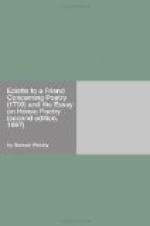The “Essay on Heroic Poetry,” serving as Preface to The Life of Our Blessed Lord and Saviour, reveals something of its author’s erudition. Among the critics, he was familiar with Aristotle, Horace, Longinus, Dionysius of Halicarnasseus, Heinsius, Bochart, Balzac, Rapin, Le Bossu, and Boileau. But this barely hints at the extent of his learning. In the notes on the poem itself the author displays an interest in classical scholarship, Biblical commentary, ecclesiastical history, scientific inquiry, linguistics and philology, British antiquities, and research into the history, customs, architecture, and geography of the Holy Land; he shows, an intimate acquaintance with Grotius, Henry Hammond, Joseph Mede, Spanheim, Sherlock, Lightfoot, and Gregory, with Philo, Josephus, Fuller, Walker, Camden, and Kircher; and he shows an equal readiness to draw upon Cudworth’s True Intellectual System and Boyle’s new theories concerning the nature of light. In view of such a breadth of knowledge it is somewhat surprising to find him quoting as extensively as he does in the “Essay” from Le Bossu and Rapin, and apparently leaning heavily upon them.
The “Essay” was composed at a time when the prestige of Rymer and neo-Aristotelianism in England was already declining, and though Wesley expressed some admiration for Rapin and Le Bossu, he is by no means docile under their authority. Whatever the weight of authority, he says, “I see no cause why Poetry should not be brought to the Test [of reason], as well as Divinity....” As to the sacred example of Homer, who based his great epic on mythology, Wesley remarks, “But this [mythology] being now antiquated, I cannot think we are oblig’d superstitiously to follow his Example, any more than to make Horses speak, as he does that of Achilles.” To the question of the formidable Boileau, “What Pleasure can it be to hear the howlings of repining Lucifer?” our critic responds flippantly, “I think ’tis easier to answer than to find out what shew of Reason he had for asking it, or why Lucifer mayn’t howl as pleasantly as either Cerberus, or Enceladus.” Without hesitation or apology he takes issue with Rapin’s conception of Decorum in the epic. But Wesley is empiricist as well as rationalist, and the judgment of authority can be upset by appeal to the court of experience. To Balzac’s suggestion that, to avoid difficult and local proper names in poetry, generalized terms be used, such as Ill-luck for the Fates and the Foul Fiend for Lucifer, our critic replies with jaunty irony, “... and whether this wou’d not sound extreamly Heroical, I leave any Man to judge,” and thus he dismisses the matter. Similarly, when Rapin objects to Tasso’s mingling of lyric softness in the majesty of the epic, Wesley points out sharply that no man of taste will part with the fine scenes of tender love in Tasso, Dryden, Ovid, Ariosto, and Spenser “for the sake of a fancied Regularity.” He had set out to defend the




